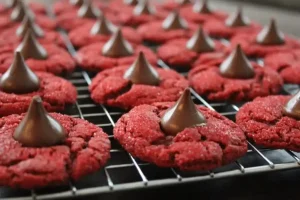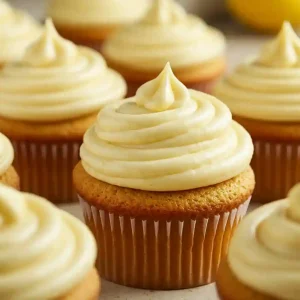Pancakes are a traditional breakfast item that many people enjoy on lazy weekend mornings. Nothing beats a stack of fluffy, golden pancakes slathered in butter and syrup.
But what if your pancakes come out dense and heavy instead of light and airy? You may be left speculating, “Why are my pancakes dense?”
Fear not, as various elements can contribute to this unsatisfactory result. It’s possible that you’re overmixing the batter, using the incorrect flour, or that your leavening agents are out of date.
In this post, I’ll look at the most common reasons pancakes become dense and offer tips and methods to help you get the ideal stack every time. So, get ready to make some lovely, fluffy pancakes.
Table of Contents
ToggleWhy Are My Pancakes Dense And Not Fluffy?
Here are the primary reasons why is my pancake not fluffy and dense.
-
Too Much Use Of Egg
Using one or two large eggs instead of medium eggs in a recipe will not make a significant difference. In any case, pancake batter is forgiving.
It may become apparent when producing a large batch of pancake batter with the wrong size eggs or mistakenly adding one egg too many to the batter.
Although too much egg’s presence is not instantly apparent when looking at the mixture, you’ll swiftly discover that something went wrong when you cook and taste your pancakes.
Rather than delectably soft pancakes, you’ll be left with a thick, custardy mass, which isn’t good.
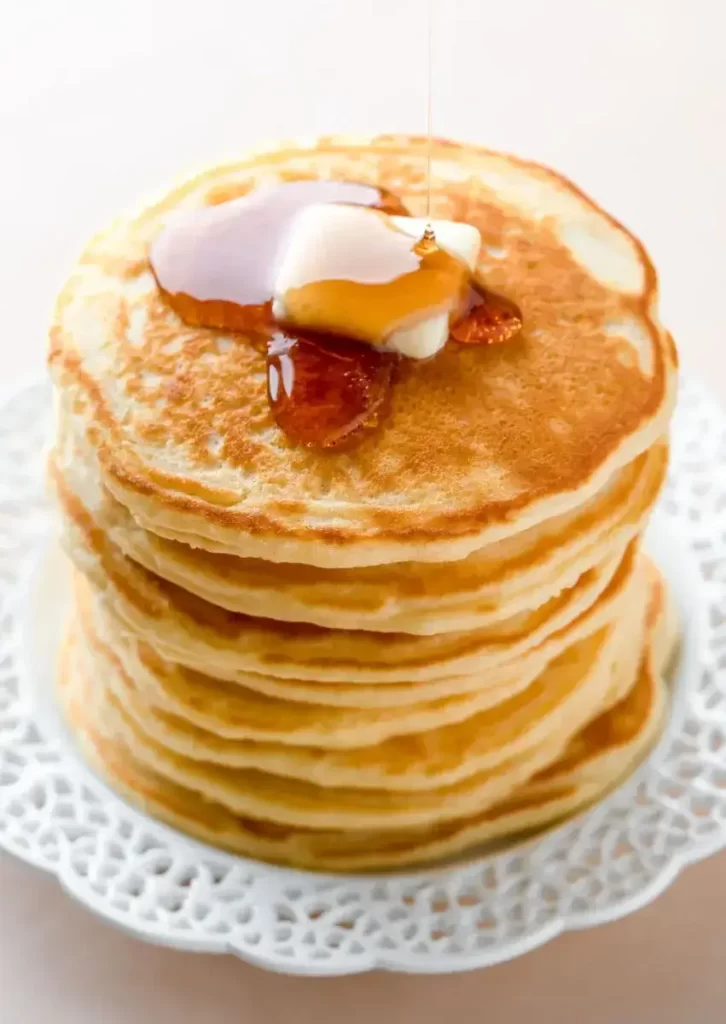
-
Overmixing The Pancake Batter
Another typical reason why my pancakes are dense and chewy is over-mixing the batter. You must mix the batter to make the pancakes, but you can go overboard if you are not careful.
The finest way to explain this is to watch how the batter looks while mixing it. If you mix the mixture until it is really smooth, your pancakes will not be as fluffy as you would like.
When you mix too much, the pancakes will end out terrible. The batter should still be slightly bubbling when you’re getting the pancakes ready to cook.
If you’re using an electric mixer, try a lower setting on your hand mixer. Also, avoid mixing the batter for too long.
At a minimum, it would be a smart idea to pause and assess the situation. It’s not difficult to get into the habit of correctly mixing pancake batter, but you may have to stop yourself if you tend to overmix things.
To avoid minor mishaps, try to be cautious of how much you mix the pancakes. If you make an effort to minimize excessive mixing, you will be significantly less likely to have problems.
-
Using Excessive Flour
When you’re sifting flour and looking forward to your pancakes, it’s easy to get carried away, and you can find that you’ve mistakenly put too much flour in the bowl.
When you use an inaccurate measuring method, such as cups, it’s very easy to do this. What can you do if you’ve accidentally added the wet components without realizing it? There are several things.
First, purchase some scales to measure your pancake components by weight. This will give you a far more exact recipe and guarantee that you have the correct quantities of items.
It may also assist in pre-measuring the flour in a separate bowl before beginning to make your pancakes. Make it a habit to double-check your measurements before combining everything.
This can help if you’ve accidentally mismeasured something, but it won’t help if you’ve already started a batch and made this error.
The only way to compensate for too much flour is to add extra liquid. You should generally use milk, while some folks prefer water. Stir with a few more splashes of milk until you reach your desired consistency.
Also, add a little additional leavening agent to ensure your pancakes are still fluffy. A tiny pinch will usually be enough.
-
Your Pan Was Not Warm Enough
A lack of heat frequently results in a lack of rising in the pancakes. Heat is required to quickly activate most of the leaveners, allowing for a large amount of gas to be created before the batter cooks and its structure settles.
This usually happens if the pan hasn’t been preheated long enough or if the heat was too low, preventing the pan from getting warm enough. When you incorporate a knob of butter, and it begins to bubble gently, your pan is hot enough.
Medium heat is frequently the optimal temperature for pancakes. Still, it varies widely depending on the pan and the stove, so experiment with the heat first to find the best temperature.
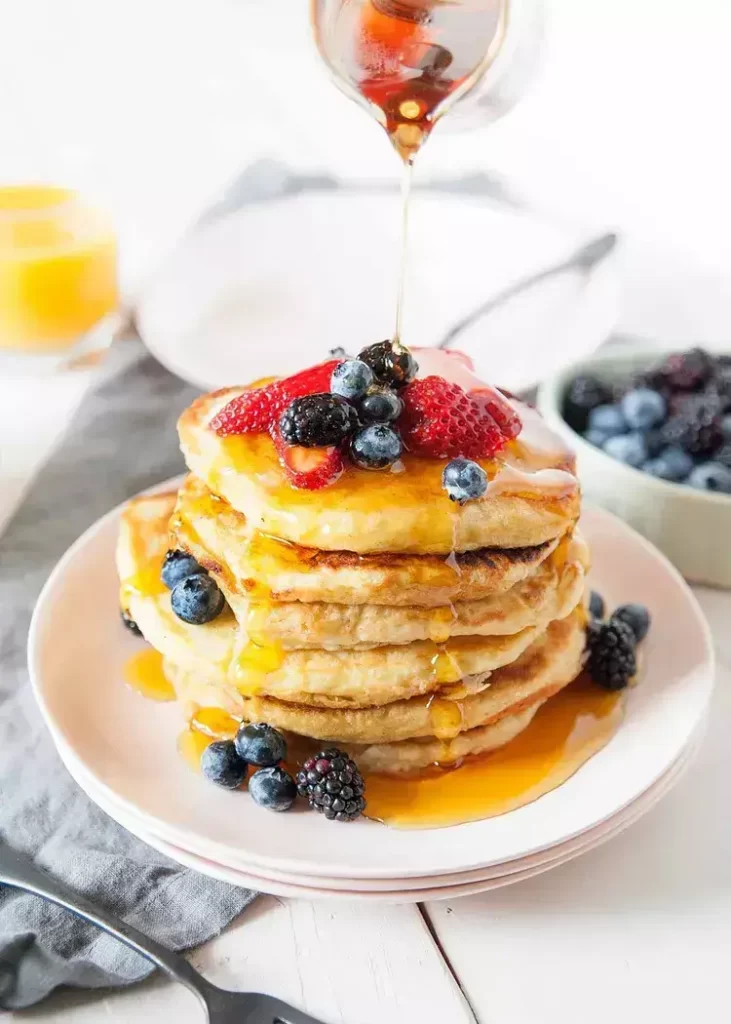
-
Expired Baking Soda Or Baking Powder
Another prevalent reason why my pancakes are dense is expired baking soda or baking powder.
Most common pancake recipes call either baking soda or baking powder. Occasionally, your pancakes will be dense because something went wrong with the baking soda or baking powder.
You should be aware that these substances will not last forever. Baking powder has a shelf life of one year, although it can go bad as soon as it’s nine months old.
Baking soda is meant to have an endless shelf life, but it could have been exposed to moisture, causing it to malfunction.
It is advised to test your baking soda and baking powder to see if they are still safe to use in baking.
To do this, drop some baking soda or baking powder into a dish of vinegar and observe the reaction. If it doesn’t react, you’ll know you need to get some fresh ingredients before you start producing pancakes.
The importance of baking soda and baking powder stems from the reactions that they can trigger. They inflate the pancakes by infusing carbon dioxide into the batter.
If the recipe is followed precisely, your pancakes will puff up and become fluffy. If your baking soda or powder has reached its expiry date, this reaction will not occur, and your pancakes will be flat and dense.
-
Using The Incorrect Flour
You may already be aware that the type of flour used has a surprising impact on the texture of baked and prepared items. Using the appropriate flour can make or break a recipe, so what kind of flour do you need for pancakes?
All-purpose flour is usually considered to be the finest choice for pancakes as it is light enough to produce a pleasing texture while without being so light that your pancakes tumble to pieces.
Pancakes will be unpleasant to eat if you don’t use the appropriate flour. Pancakes prepared using bread flour are typically dense and chewy and should be avoided.
You might believe pastry flour is a better choice, but it is too light, and your pancakes will fall apart. It’s not much better than a dense bread-flour pancake!
Pancakes do not require the use of self-rising flour. This is because most pancake recipes need a separate leavening agent to be used, and if you add two, your pancakes will most likely taste weird. You can also make them overly crumbly.
-
Not Allowing The Batter To Rest
One of the biggest reasons why are my pancakes dense is that your pan is not hot enough. After mixing the batter, prepare the table and heat the griddle.
Waiting at least 10 minutes before cooking allows the flour to hydrate fully and the leavening to begin working, resulting in fluffy pancakes.
-
Not Utilizing Room Temperature Ingredients
People who make pancakes daily say they prefer to use room-temperature ingredients. Using fresh ingredients from the fridge can provide less-than-ideal results.
If you’re going to make morning pancakes, prepping your ingredients ahead of time is a brilliant idea. This will allow your ingredients to come to room temperature before mixing your batter.
Air can enter the batter more easily this way. Adding air to the pancakes will make them lighter and fluffier, improving their flavor.
Injecting air into the batter may be more difficult when using cold components. Try utilizing room-temperature ingredients instead of cold ones for better results.
Before preparing pancakes, prepare your ingredients and place them on the counter. Although it will take longer this way, it will be worth it if the pancakes taste better.
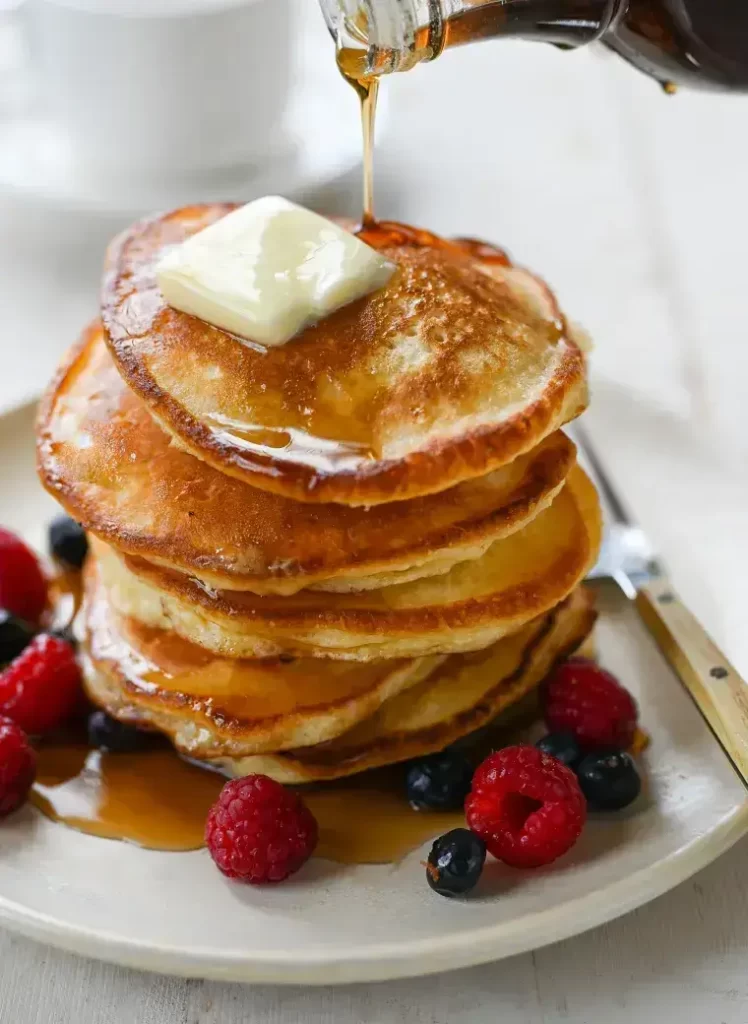
-
Using Excess Fat
Another common cause of why are my pancakes flat and dense is using too much fat. Although many people enjoy adding fat to their pancakes in the form of butter, adding excessive butter makes the pancakes soggy.
The butter, you see, almost weighs down the batter, making it overly moist. It disperses itself throughout the pancake batter, limiting the size of the interior bubbles in the pancakes.
Of course, fat is necessary for flavor, texture, and moistness, but too much fat results in pancakes that are denser than they should be.
-
Excessive Use Of Baking Powder
Too much baking powder in a pancake recipe will undoubtedly destroy the pancakes. It’s tempting to do this if you’re having trouble with dense pancakes, but you must resist.
Undoubtedly, if you use a lot of baking powder in the pancakes, they will rise, but they will also become inedible. Baking powder has a strong flavor that will be evident if the ratio in a recipe is increased, giving your pancakes a sour, displeasing taste.
It may also cause the pancakes to rise uncontrollably, resulting in uneven, unappealing pancakes. Because the batter is delicate and unable to hold the air properly, they may slump and become dense after cooking.
Consequently, you should only utilize the amount of baking powder specified in the recipe and not add any more. This should produce the most remarkable outcomes.
Frequently Asked Questions
-
Why Are Restaurant Pancakes So Fluffy?
The secret to fluffy restaurant-style pancakes is buttermilk! The buttermilk’s acid reacts with the leavening chemicals in the pancake mix, resulting in air bubbles that make the pancakes tall and fluffy. It is a minor change that makes a big contrast.
-
Does Adding More Baking Powder Make Pancakes Fluffier?
Yes, adding more baking powder to pancake batter can help make them fluffier. Baking powder is a leavening chemical that, when heated, produces carbon dioxide, causing the batter to rise and generate air pockets.
These air pockets contribute to a lighter, fluffier texture. However, using the amount of baking powder mentioned in the recipe is critical since adding too much can result in an unpleasant taste or even cause the pancakes to collapse.
-
How Do You Fix Dense Pancake Batter?
Add a few tablespoons of extra liquid to the bowl until it reaches the desired pancake batter consistency. If you incorporate two to three tablespoons of more liquid, be sure to add ¼ teaspoon of baking powder too.
-
What Happens If You Overmix Pancake Batter?
Over-mixing causes gluten to form from the flour in your batter, leaving your pancakes chewy rather than fluffy.
-
How Long Should You Let Pancake Batter Rest?
Allow the pancake batter to rest for around 10 to 30 minutes. Letting the batter rest helps the dry ingredients to hydrate and the gluten to relax, resulting in lighter and more tender pancakes.
The batter will thicken somewhat, and lumps will dissolve during this resting period. However, a 5-minute break can still produce good outcomes if you’re in a hurry.
Conclusion
Making fluffy and delicious pancakes is an art that takes meticulous attention to detail. Why are my pancakes dense and chewy can be a frustrating experience, but with a few simple changes to your recipe and cooking procedures, you can get the desired light and airy texture.
There are numerous ways to diagnose and fix your dense pancake problem, whether it’s changing your batter consistency, using the proper cooking temperature, or using fresh baking powder.
Don’t give up on your pancake fantasies just yet. Continue experimenting and attempting new approaches until you achieve the beautiful fluffy stack of pancakes you’ve been craving.
Bear in the head that practice makes perfect, and with a bit of dedication and patience, you’ll be a pancake pro shortly!
You May Like To Read These Posts Too
- Can You Put Cookie Dough In The Microwave
- How To Keep Bread From Molding
- How to Store Frosted Cupcakes Overnight
- How Long Does Zucchini Bread Last
- How to Tell If Flour Has Gone Bad



